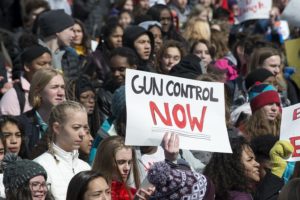You have no items in your cart. Want to get some nice things?
Go shopping When we began preparing for life in the United States, J. and I did not think of school shootings. Sandy Hook had happened by then, so we were not completely unaware of such catastrophes but we somehow imagined that a tragedy of such magnitude would surely challenge America with the need for more commonsensical gun laws and reduce, if not totally eliminate the chances of another school shooting (hope is free, after all). We did not think that a country as developed as the USA, a country as vocal on human rights on the global stage as the United States, would not be shocked into action by the senseless deaths of twenty children and six adults, just two weeks before Christmas. “Surely,” I told a friend as we walked our children to school that December morning, holding them tighter than we normally would, “no one could look at the pictures of those children, or imagine their fear as they were being attacked or the pain their families must be suffering and not ‘do the right thing’.” Whatever the right thing was, it had to involve making sure that such a senseless tragedy never happened again. Living in Belgium, J. and I had not heard of the other, less-reported school shootings that happened between Sandy Hook and when we moved in August 2013 (thirteen in total) and I began to believe that America had done all it could (and succeeded) to make sure that Sandy Hook never happened elsewhere in the country.
When we began preparing for life in the United States, J. and I did not think of school shootings. Sandy Hook had happened by then, so we were not completely unaware of such catastrophes but we somehow imagined that a tragedy of such magnitude would surely challenge America with the need for more commonsensical gun laws and reduce, if not totally eliminate the chances of another school shooting (hope is free, after all). We did not think that a country as developed as the USA, a country as vocal on human rights on the global stage as the United States, would not be shocked into action by the senseless deaths of twenty children and six adults, just two weeks before Christmas. “Surely,” I told a friend as we walked our children to school that December morning, holding them tighter than we normally would, “no one could look at the pictures of those children, or imagine their fear as they were being attacked or the pain their families must be suffering and not ‘do the right thing’.” Whatever the right thing was, it had to involve making sure that such a senseless tragedy never happened again. Living in Belgium, J. and I had not heard of the other, less-reported school shootings that happened between Sandy Hook and when we moved in August 2013 (thirteen in total) and I began to believe that America had done all it could (and succeeded) to make sure that Sandy Hook never happened elsewhere in the country.
When our children returned from their first Code Red Drill at school (where students are taught how best to come out of a school shooting alive and unharmed), they recounted in breathless detail what they had to do and compared notes with each other. Along with school buses and cheerleaders and the peculiar American enthusiasm for high-school football, their first code red drills were the biggest cultural shocks they had after moving from Europe to America. I sat and listened and felt as if America had already taken part of their innocence. There was something incredibly sad about it. There is something incredibly sad about a country where children are burdened with anxiety and fear and the knowledge that school is not after all a safe space. I found myself wishing that these drills did not happen – but they must, because they are essential. The statistics of shootings on school grounds are staggering. Since 2013, there have been over 300 school shootings in the United States. Since the Stoneman Douglas High School shooting on Valentine’s Day, where a teenager killed 17 people, there have been five more shootings on school campuses across the United States (and at least one shooting per month since January!).
However, the students of the affluent Parkland, Florida community where Stoneman Douglas High is situated, have kept the national spotlight on their particular tragedy, demanding better gun control rules, appearing on TV, meeting with politicians, holding demonstrations and forcing a national dialogue on America’s relationship with guns (and the power of the NRA). All sensible and mature reactions from students who have been through the second-deadliest US public school shooting ever. Arguably, their common voice is as magnified as it is because they are mostly white and mostly rich. What isn’t arguable is that many of these students are using their privilege of class and race for good. They are not asking for much and yet, as I have come to realize living here, nothing divides Americans quite as much as how the Second Amendment is interpreted.
Gun violence is a potential danger to all, regardless of party line, but gun control rhetoric is incredibly bipartisan, fueled in part by the National Rifle Association’s political power. The NRA’s influence is massive. In the 2016 elections, the NRA and its partners spent an excess of $50 million in adverts to boost pro-NRA GOP candidates and attack pro-gun-reform Democrats. With Trump in power and a GOP majority in the House, it is clear that this administration does not have the will to antagonize the NRA. Just one day after motivated, passionate young people organized the successful March for Our Lives demonstrations across the US, a former GOP senator from Pennsylvania, Rick Santorum, incredibly stated on CNN that the students’ time would be better served taking CPR classes. Apart from its ridiculousness (what has learning CPR to do with calling for gun-control reform?), it is also condescending to a group that has proven itself more intellectually capable than the present leader of the GOP and evidently than Santorum himself (certainly when it comes to leading the discussion on gun control). Santorum’s comment is illustrative of the kind of brick wall gun-reform advocates hit from the opponents who read the Second Amendment to preclude any sort of rational discussion around guns (and gun control).
Exactly a month after the Parkland shooting, my son’s high school sent out a mail to parents about “many reports of a threat made against the school for tomorrow… The administration along with school police have thoroughly investigated all reported information and have found nothing credible to substantiate a threat to our school.” J. and I were grateful that the threats were unsubstantiated but we struggle with understanding how in a country that lives with the constant threat of another school shooting, gun-reform policy is as controversial as it is. In the words of one of my best friends, Maggie, the mind boggles.

About Chika Unigwe
Chika Unigwe is a Nigerian writer. She is the author of fiction, poetry, articles and educational material. Her latest novel, Night Dancer, was published in Dutch in 2011 (as Nachtdanser) and in English in 2012





CBD oil has seen a spike in interest in the recent past. As this hype continues to grow, you might have become curious about the benefits of the oil. Although the use of medical marijuana is still a politically and emotionally charged topic, research shows that there may be huge benefits of the CBD oil. Most people around the world are beginning to take note since there is evidence to back up the claims about the benefits.